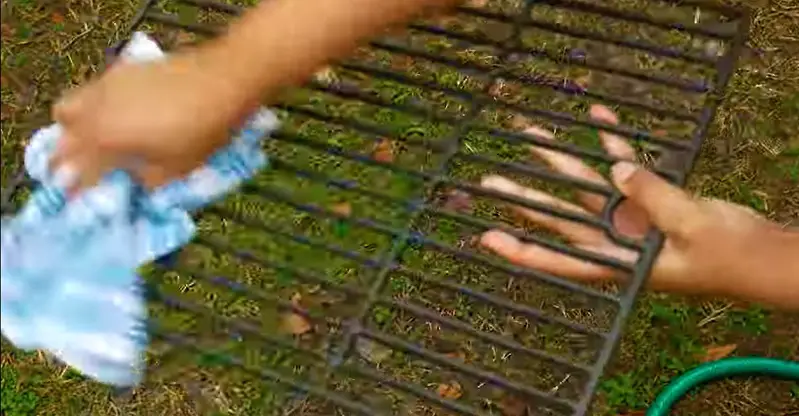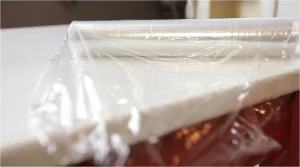Using Vegetable Oil to Season a Grill: Benefits and Process
Using vegetable oil to season a grill is a popular and effective method of maintaining the quality and longevity of your grill. It is a natural and affordable option compared to buying specialized seasoning oils.
Vegetable oil creates a protective layer on the grill grates, which helps to prevent food from sticking and also helps to keep the grill rust-free. This layer also provides a non-stick surface that makes it easy to clean your grill.
Vegetable oil is a versatile oil that can be used to season different types of grills, including Blackstone grills and griddles. You can also use it to season your grill grates and to grill various types of foods, including grilled cheese sandwiches.
Canola oil is another type of vegetable oil that can be used to season a grill. It has a neutral taste and a high smoke point, which makes it ideal for grilling at high temperatures.
Remember, you should only use pure vegetable oils for seasoning a grill. Blended oils or oils with added ingredients may not be suitable for seasoning grills and can affect the taste and quality of your food.
Types of Vegetable Oil Suitable for Seasoning a Grill
Using vegetable oil to season a grill is a popular method for preventing food from sticking to the grates and extending the life of the grill. Not all vegetable oils are suitable for this purpose.
Flaxseed oil
Flaxseed oil is a popular choice for seasoning a grill due to its high smoke point and ability to polymerize. This means that it forms a hard, protective coating on the grill grates that is resistant to rust and corrosion.
Canola oil
Canola oil is another vegetable oil that is suitable for seasoning a grill. It has a high smoke point, which means it can withstand high temperatures without burning, and it is also low in saturated fat.
Vegetable oil
Vegetable oil is a generic term that can refer to a variety of different oils, such as soybean oil, corn oil, and sunflower oil. While vegetable oil can be used to season a grill, it is not the best choice as it has a lower smoke point than some other oils and can leave a sticky residue on the grates.
Using Vegetable Oil to Clean a Grill: Process
Step 1: Preparing the Grill
Before using vegetable oil to clean a grill, it is essential to prepare the grill. First, remove any excess food debris and ash from the grill grates using a grill brush. Next, fill a bucket with warm, soapy water, and use a sponge or cloth to wipe down the grill grates, lid, and interior surfaces. Rinse everything thoroughly with clean water and allow it to air dry.
Step 2: Applying Vegetable Oil
Once the grill is clean and dry, it is time to apply the vegetable oil. Dip a cloth or paper towel in vegetable oil and use it to coat the grill grates lightly. Be sure to cover all the surfaces of the grill grates thoroughly. Alternatively, use a cooking spray with vegetable oil to spray the grill grates lightly.
Step 3: Heating the Grill
After applying the vegetable oil to the grill grates, it is time to heat the grill. Turn the grill to high heat and let it heat up for at least 15-20 minutes. This high heat will help to burn off any excess oil and allow the vegetable oil to bond with the grill grates properly.
Step 4: Cleaning the Grill
Once the grill has heated up, use a grill brush to scrub the grill grates lightly. This will remove any excess oil and food debris. Be sure to brush the grates in a back-and-forth motion, rather than in a circular motion, to prevent any damage to the grates.
Step 5: Maintaining the Grill
To maintain the vegetable oil seasoning on the grill, it is essential to clean the grill grates after each use. Use a grill brush to remove any excess food debris, and wipe down the grates with a cloth or paper towel dipped in vegetable oil. This will help to maintain the seasoning and prevent rust from forming on the grill grates.

Maintaining and Longevity of Vegetable Oil Seasoning on a Grill
Seasoning your grill with vegetable oil is a simple and effective way to maintain the quality and longevity of your grill. The oil creates a protective layer on the grill grates, which helps to prevent food from sticking and also helps to keep the grill rust-free.
To maintain the seasoning on your grill, it is important to clean your grill regularly. Use a wire brush or scraper to remove any food residue or debris from the grates. Avoid using harsh chemicals or abrasive cleaners that can strip away the seasoning.
When cooking on your grill, be sure to preheat it to the desired temperature before adding food. This helps to ensure that the oil coating is evenly distributed and that your food cooks evenly.
Over time, the seasoning on your grill may wear away or become uneven. If this happens, simply reapply a new layer of vegetable oil to the grill grates and repeat the seasoning process. With proper maintenance and care, the seasoning on your grill can last for many years.
Alternative Methods for Seasoning a Grill
While using vegetable oil is a popular method for seasoning a grill, there are alternative methods that you can use as well. For example, you can use bacon fat, lard, or tallow to season your grill. These fats are high in saturated fat and have a higher smoke point than vegetable oils.
To season your grill with bacon fat, simply heat the grill to a high temperature and apply a thin layer of bacon fat to the grates using a brush or paper towel. Let the grill cool, and then repeat the process several times until a smooth, non-stick surface is achieved.
Another alternative method for seasoning a grill is to use salt. Sprinkle a layer of coarse salt onto the grill grates and heat the grill to a high temperature.
Let the salt sit for several minutes, then scrape it off with a wire brush or scraper. This method helps to remove any debris or rust from the grill and creates a non-stick surface.
Risks and Downsides of Using Vegetable Oil to Season a Grill
While using vegetable oil to season a grill can have its benefits, there are also some risks and downsides to be aware of. Here are some potential issues to consider:
Health concerns
Using vegetable oil to season a grill can create harmful smoke and fumes when heated. This can be a concern for people with respiratory issues or those who are sensitive to smoke. Also, some vegetable oils are high in omega-6 fatty acids, which can be harmful when consumed in excess.
Sticky residue
Some vegetable oils can leave a sticky residue on the grill grates, which can make them harder to clean and maintain. This can also cause food to stick to the grates, which defeats the purpose of seasoning the grill in the first place.
Flammability
Vegetable oils are highly flammable, which can be a concern when using them on a grill. If the oil is not applied evenly or excess oil is left on the grates, it can ignite and cause a fire. It’s important to exercise caution and follow proper safety procedures when using vegetable oil to season a grill.





